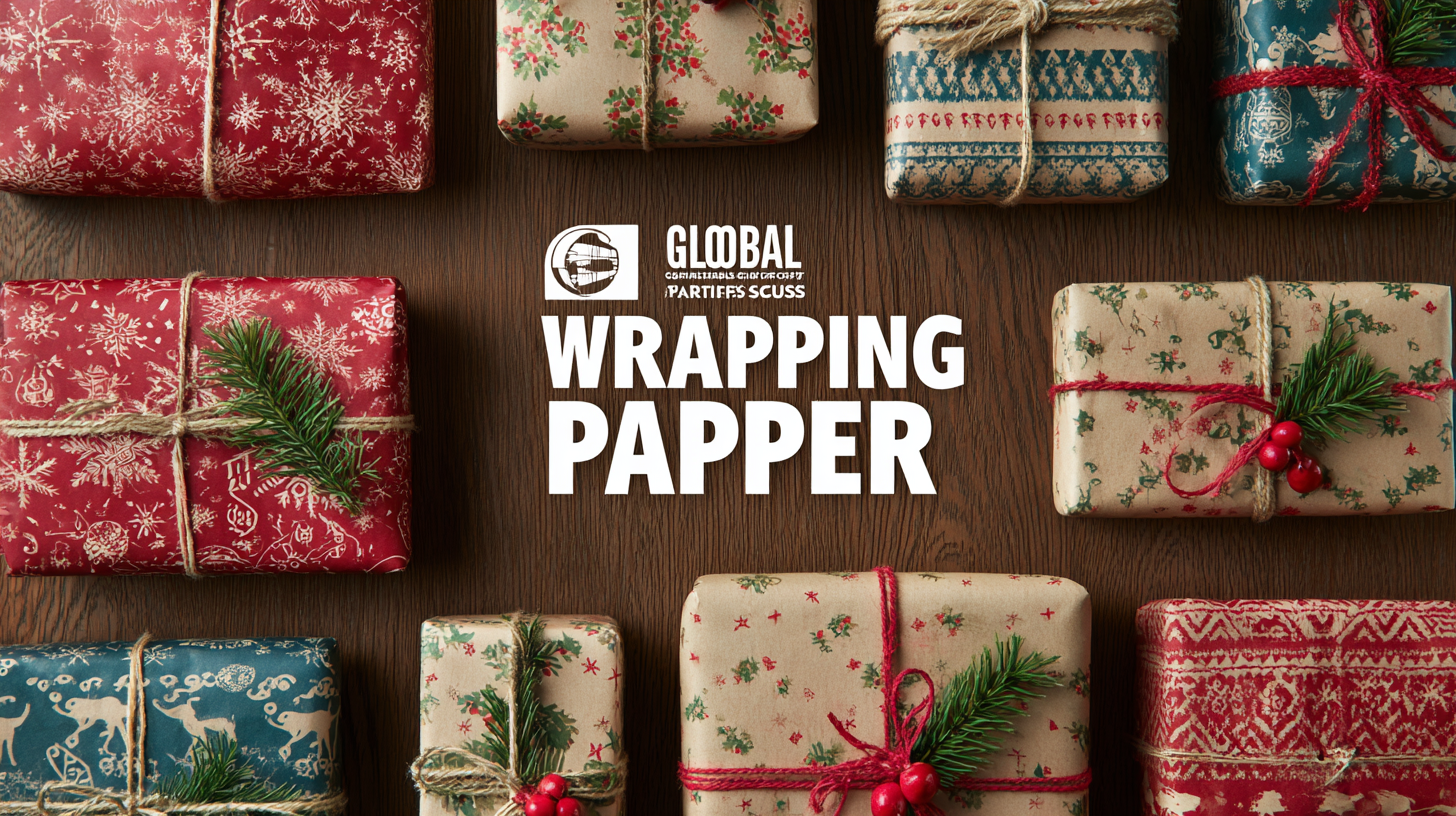
 In today’s increasingly interconnected global marketplace, the success of
wrapping paper exports hinges not only on product quality and design but also on the necessary
certifications that can elevate a brand's reputation and credibility.
As consumer expectations evolve and sustainability takes center stage, it is essential for businesses in the wrapping paper sector to
navigate the complexities of international regulations and standards effectively. Unlocking global markets requires a strategic approach,
and understanding the five essential certifications can be a game changer for export success.
This blog will explore the critical certifications that can help businesses not only meet regulatory requirements but also appeal to
environmentally conscious consumers, ultimately positioning their wrapping paper products for greater market penetration and
competitiveness.
In today’s increasingly interconnected global marketplace, the success of
wrapping paper exports hinges not only on product quality and design but also on the necessary
certifications that can elevate a brand's reputation and credibility.
As consumer expectations evolve and sustainability takes center stage, it is essential for businesses in the wrapping paper sector to
navigate the complexities of international regulations and standards effectively. Unlocking global markets requires a strategic approach,
and understanding the five essential certifications can be a game changer for export success.
This blog will explore the critical certifications that can help businesses not only meet regulatory requirements but also appeal to
environmentally conscious consumers, ultimately positioning their wrapping paper products for greater market penetration and
competitiveness.
When considering the export of wrapping paper, selecting the right manufacturers is pivotal to success in global markets. A robust supply chain that encompasses the entire process—from sourcing raw materials to order fulfillment—can significantly enhance efficiency and reliability. Evaluating manufacturers involves assessing their capabilities in managing logistics, quality control, and production scale. An effective supply chain ensures that your product is not only innovative but also timely delivered, meeting the demands of international customers.

Additionally, as industries evolve, so does the need for manufacturers to adopt advanced technologies. Countries with strong innovation capabilities are leading the way, making it crucial for exporters to collaborate with forward-thinking manufacturers. By leveraging Enterprise Resource Planning (ERP) systems, potential partners can streamline operations, optimize resource management, and improve customer satisfaction through enhanced tracking and reporting capabilities. In the competitive world of wrapping paper exports, understanding these key factors and choosing the right manufacturers can secure a foothold in the global market.
When considering the export of wrapping paper, understanding the
essential certifications and documentation
can significantly influence your success in global markets. Exporting requires navigating a myriad of regulations,
and obtaining the correct certifications ensures that your products meet international standards. Key certifications
to consider include the Certificate of Origin, which verifies the country
of origin for your goods, and other quality assurance certifications that signal compliance with international safety
and ecological standards.
Tips for securing these certifications include researching the specific requirements based on your target market.
For instance, if you're exporting to the USA, familiarize
yourself with the necessary documentation to avoid customs issues. Engaging with local export consultants can
streamline this process by providing insights on regulatory changes and ensuring you gather all necessary permits.
Additionally, utilizing a Business Identification Number (NIB)
may simplify import and export activities in regions like Indonesia.
Lastly, always keep an eye on changing regulations, such as those in countries like India,
where understanding import and export procedures is crucial. Staying informed about the latest legal requirements
will help you maintain compliance and avoid costly pitfalls, thus enhancing your business's reputation in the
global market.
When delving into the global market for wrapping paper, evaluating manufacturer capabilities is paramount to ensure both quality and reliability. A robust assessment process should involve scrutinizing the production facilities. Visiting the manufacturing site or requesting virtual tours can provide insights into the equipment, technology, and safety standards employed. This firsthand knowledge allows exporters to gauge whether a manufacturer's processes align with international standards and sustainability practices, thereby ensuring premium product quality.

Furthermore, examining certifications and quality control measures is essential. Familiarize yourself with recognized certifications relevant to wrapping paper, such as ISO 9001 or Forest Stewardship Council (FSC) certification, as they reflect a commitment to quality management and sustainable sourcing. It's also wise to review customer feedback and case studies highlighting the manufacturer's performance in previous export scenarios. Such evaluations can reveal the manufacturer's reliability and responsiveness to market demands, giving you a clearer picture of their capability to meet your specific requirements. By prioritizing these aspects, you position yourself for successful partnerships and greater achievement in the wrapping paper export business.
Navigating the complexities of global markets can be a daunting task for exporters, especially when it comes to compliance with diverse regulations and standards. Certifications play a pivotal role in demonstrating a company’s commitment to quality and safety, ultimately impacting marketability. For exporters of wrapping paper, understanding and pursuing the right certifications is crucial. Internationally recognized standards such as ISO 9001 for quality management and FSC certification for sustainable sourcing not only enhance a company’s credibility but also align with the increasing demand for environmentally responsible products.
Utilizing certifications effectively can differentiate a business in a crowded marketplace. For instance, obtaining CE marking can facilitate access to European markets by confirming that products meet strict EU regulations. Similarly, certifications like ASTM or ANSI can provide assurance regarding product safety and performance, which are vital in consumer decision-making. By prioritizing certifications that resonate with target markets, exporters can position themselves strategically, building trust with clients and ensuring compliance with local regulations. In this way, navigating global market standards becomes a pathway to export success.
| Certification Name | Description | Relevance | Target Market | Validity Period |
|---|---|---|---|---|
| ISO 9001 | Quality management systems standard ensuring consistent quality service and products. | Quality assurance and improvement | Global | 3 years |
| FSC Certification | Ensures that paper products come from responsibly managed forests. | Sustainability and sourcing | Europe, North America | 5 years |
| FDA Compliance | Regulatory standard for products in contact with food in the U.S. | Food safety | United States | Ongoing |
| EU Ecolabel | Environmental standard certifying eco-friendly products in the EU. | Environmental impact | European Union | 3 years |
| SGS Certification | Global leader in inspection, verification, testing, and certification. | Credibility and safety assurance | Global | Varies |
When venturing into the global wrapping paper market, ensuring manufacturer compliance is crucial for success. First, assess the certifications held by your potential manufacturers. Look for industry-standard certifications such as FSC (Forest Stewardship Council) or PEFC (Programme for the Endorsement of Forest Certification), which indicate sustainable sourcing and environmental responsibility. These certifications reflect a commitment to ethical practices, which can enhance your brand’s reputation and appeal to eco-conscious consumers.
Next, it’s essential to perform thorough audits of the manufacturers’ production processes. This includes reviewing their quality control measures and ensuring compliance with international standards. Request detailed reports on their production techniques, raw material sourcing, and waste management practices. Additionally, visiting manufacturing facilities firsthand can provide valuable insights into their operational integrity. By prioritizing these assessment criteria, you can establish partnerships with reliable manufacturers and secure a competitive edge in the lucrative wrapping paper export market.